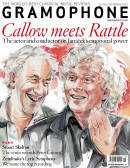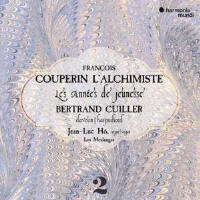Texte paru dans: / Appeared in: |
|
|
Outil de traduction (Très approximatif) |
|
|
Reviewer:
Michelle Assay Normally, when I have a good feeling about a recording from an initial dip my admiration grows with repeated listening and digging into its background. But with Bertrand Cuiller’s latest volume, it’s the opposite, because I’ve grown increasingly frustrated and suspicious, not so much of the quality of performance as of the ‘idea’. As the title and notes – including Cuiller’s own blurb in the booklet – suggest, this is a series for which the concept seems to be almost as important as the content. Starting with ‘alchimiste’. An interview with Cuiller on France Musique brought me no closer to understanding the idea. It certainly seems to have nothing to do with the proper meaning of turning base metal into gold or some other transmutation of matter. And the flowery notes of the first volume (not by the artist) have only one mention of alchemy – in relation to Michael Maier’s Atalanta fugiens (an early modern emblem book). This, Cuiller’s interview and his highly fantastical synaesthetic attitude to shuffling Couperin’s ordres, as well as his repeated references to a ‘voyage imaginaire’, made me wonder if his alchemist is in fact more to do with the new-age novel of that title by Paulo Coelho, which to many young people of my (and Cuiller’s) generation became the literary equivalent of a hallucinogenic trip. None of which is helpful. Fortunately the Frenchman’s skills at the harpsichord are not in doubt, and he demonstrates great sensitivity to the stylistic and formal properties of Couperin’s musical world. For Vol 2 he performs the first two ordres from the first livre (there are four books, containing 27 ordres and over 200 pieces). These are among the longest of Couperin’s ordres, each comprising a set of traditional dances followed by a series of character pieces. Cuiller is particularly convincing in the livelier dances and in the more majestic numbers; he is spirited yet never rushed, allowing each piece to unfold in a natural yet forward flow. Unlike most other surveys, he is sticking, for now at least, to just one instrument – a copy of an anonymous 17th-century harpsichord. The sound is not short of presence and weight, and hence in the slower numbers the enigmatic, elegiac longing normally associated with Couperin is less abundant than with Scott Ross, Laurence Boulay (both Erato) and even Blandine Verlet (Naïve), while Olivier Baumont (Erato) and Davitt Moroney (Harmonia Mundi) bring a finer-tuned gracefulness and elegance. And to get an idea of what may have inspired Couperin’s idiosyncratic titles, the notes to the recent reissue of Baumont’s survey (1/19) are much more helpful than those to either of Cuiller’s volumes. Apart from the somewhat clunky translation, the notes to Cuiller’s latest disc are mainly concerned with the two organ Masses. Which brings me to the second conceptual problem – the balance in the programming. In the first volume of his ‘intégrale’, Cuiller had mentioned the special feature of his survey, which supplements the harpsichord music with other works of Couperin. That volume didn’t deliver on the promise and was entirely made up of harpsichord ordres (supposedly assembled according to the theme of theatre). The second volume over-compensates by assigning more than half of the recording time to Couperin’s early organ Masses. Despite the pleasure of hearing the two fabulous historic instruments from Notre-Dame de Juvigny (1662-63) and Abbaye de Saint-Michelen-Thiérache (1714), the sheer weight of the repertoire overshadows the harpsichord pieces. Not that such masterful performances of these substantial Masses are unwelcome, and they are presented, as would have been the norm at the time of Couperin, in alternation with plainchant. The director of Les Meslanges provides some interesting explanations regarding the choice of chants and their Latin pronunciation. Organist Jean-Luc Ho takes the challenges of these works head-on: from registrations as indicated by the composer to ornamentation and phrasing not so indicated. There is exuberance and intimacy in his musicianship without any trace of self-indulgence or pseudo-grandeur. The theme of this volume, ‘Les années de jeunesse’, in fact only applies to these organ works, which Couperin composed five years after taking up the ‘throne’ of Saint-Gervais at the age of 17 (the first harpsichord livre dates from 23 years later – hardly youthful years). This is another reason to consider the organ works to be the main star of what has been understood to be a survey of Couperin’s works for harpsichord. Presumably future volumes will return to the harpsichord-focused repertoire of the first. |
|




